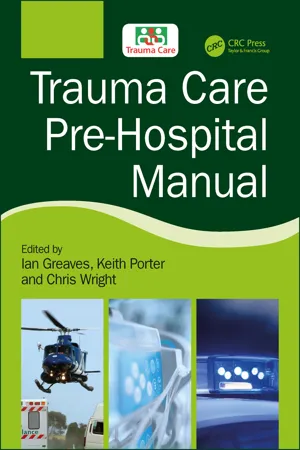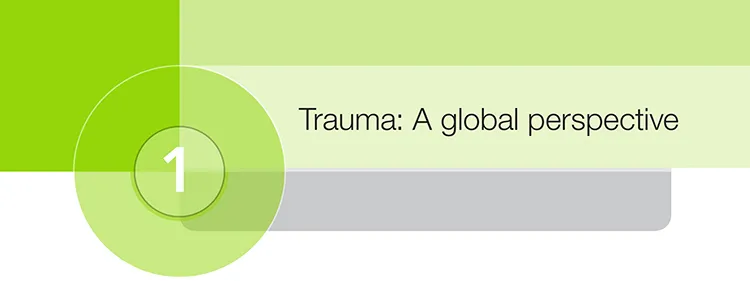
eBook - ePub
Trauma Care Pre-Hospital Manual
Ian Greaves, Keith Porter, Ian Greaves, Keith Porter, Chris Wright
This is a test
- 412 Seiten
- English
- ePUB (handyfreundlich)
- Über iOS und Android verfügbar
eBook - ePub
Trauma Care Pre-Hospital Manual
Ian Greaves, Keith Porter, Ian Greaves, Keith Porter, Chris Wright
Angaben zum Buch
Buchvorschau
Inhaltsverzeichnis
Quellenangaben
Über dieses Buch
This new book provides evidence based guidelines for the immediate clinical management of major trauma.It has been written by clinicians with many years of trauma experience, and endorsed as authoritative by Trauma Care (UK).
The UK now has highly effective trauma systems. Clinical developments include the introduction of damage control resuscitation, tranexamic acid, blood product resuscitation, novel hybrid resuscitation and an emphasis on the control of major external haemorrhage as part of a new ABCDE approach. Consequently, more individuals with major trauma are surviving than ever before. Optimal pre-hospital care is essential for improved survival rates and reduced morbidity.
Häufig gestellte Fragen
Wie kann ich mein Abo kündigen?
Gehe einfach zum Kontobereich in den Einstellungen und klicke auf „Abo kündigen“ – ganz einfach. Nachdem du gekündigt hast, bleibt deine Mitgliedschaft für den verbleibenden Abozeitraum, den du bereits bezahlt hast, aktiv. Mehr Informationen hier.
(Wie) Kann ich Bücher herunterladen?
Derzeit stehen all unsere auf Mobilgeräte reagierenden ePub-Bücher zum Download über die App zur Verfügung. Die meisten unserer PDFs stehen ebenfalls zum Download bereit; wir arbeiten daran, auch die übrigen PDFs zum Download anzubieten, bei denen dies aktuell noch nicht möglich ist. Weitere Informationen hier.
Welcher Unterschied besteht bei den Preisen zwischen den Aboplänen?
Mit beiden Aboplänen erhältst du vollen Zugang zur Bibliothek und allen Funktionen von Perlego. Die einzigen Unterschiede bestehen im Preis und dem Abozeitraum: Mit dem Jahresabo sparst du auf 12 Monate gerechnet im Vergleich zum Monatsabo rund 30 %.
Was ist Perlego?
Wir sind ein Online-Abodienst für Lehrbücher, bei dem du für weniger als den Preis eines einzelnen Buches pro Monat Zugang zu einer ganzen Online-Bibliothek erhältst. Mit über 1 Million Büchern zu über 1.000 verschiedenen Themen haben wir bestimmt alles, was du brauchst! Weitere Informationen hier.
Unterstützt Perlego Text-zu-Sprache?
Achte auf das Symbol zum Vorlesen in deinem nächsten Buch, um zu sehen, ob du es dir auch anhören kannst. Bei diesem Tool wird dir Text laut vorgelesen, wobei der Text beim Vorlesen auch grafisch hervorgehoben wird. Du kannst das Vorlesen jederzeit anhalten, beschleunigen und verlangsamen. Weitere Informationen hier.
Ist Trauma Care Pre-Hospital Manual als Online-PDF/ePub verfügbar?
Ja, du hast Zugang zu Trauma Care Pre-Hospital Manual von Ian Greaves, Keith Porter, Ian Greaves, Keith Porter, Chris Wright im PDF- und/oder ePub-Format sowie zu anderen beliebten Büchern aus Medicine & Surgery & Surgical Medicine. Aus unserem Katalog stehen dir über 1 Million Bücher zur Verfügung.
Information

Objectives
After completing this chapter the reader will
- Comprehend the scale of the challenge presented by trauma across the world
- Understand the different effects of trauma in developed and less developed societies
- Understand the importance of prevention in reducing the impact of trauma internationally
Introduction
All we can do in the face of that ineluctable defeat called life is to try to understand it.
Milan Kundera, The Curtain (1)
The aetiology, pathophysiology and management of trauma are complex and challenging. In contrast to a disease process, trauma as an aetiological factor involves more or less immediate external energy transfer into the human body, whether caused by mechanical, thermal or some other form of energy. In order to better understand the multitude of factors involved in the process of traumatic injury, a wider perspective encompassing the context in which the trauma occurs is warranted. When analysing the evolving trends in trauma, a perspective is needed that goes beyond narrow local and clinically orientated views. This chapter considers trauma in its widest context, including other causes of mortality and morbidity, with an emphasis on the causes and manifestations of trauma on a global scale.
The Big Picture
Many seemingly unrelated events in different parts of the world produce the same end result: one or more people are severely injured or killed as a result of trauma, whether associated with a natural or man-made disaster, a single violent act by an individual, organised crime, an industrial accident, terrorism or warfare. Although easily interpreted as individual and unrelated events, there are many trends in the globalised world that offer at least a partial explanation of the root causes of these occurrences.
Various combinations of fundamentalism, individual and institutional greed, inequality and lack of basic human rights and democracy, just to mention the most obvious factors, can lead to unforeseen consequences. For example, the Arab Spring, which began on December 18, 2010, in Tunisia as a protest against police corruption and ill treatment, triggered demonstrations, protests, riots, civil wars and revolutions all over North Africa and the Middle East culminating in the Syrian civil war that started in 2011. As a consequence of the Syrian civil war, hundreds of thousands of Syrians have sought to escape their war-torn country creating the worst refugee problem in Europe since the Second World War. After 4½ years of war, more than a quarter of a million people have died, many whilst trying to cross the Mediterranean or in the hands of human traffickers. Eleven million have fled their homes (2). In addition to these refugees from war, many others seek better living conditions by trying to enter the United States or the European Union illegally, adding to the already explosive refugee problem.
The financial crisis of September 2008 originating in the United States but having economic consequences throughout the world can be seen just as a temporary setback in continuous globalisation and the success story of the current consumer- and market-orientated way of life. However, it could also be a signal that the current culture based on speculation and immediate reward is no longer sustainable. Immanuel Wallerstein (3) has predicted that after half a millennium of success, the recognisable capitalist world order is coming to an end and is likely to bring chaos for the next 50 years. The main reason he gives is a decrease in profits due to a shortage of cheap labour and natural resources. According to some economists, there are also fundamental flaws in the global monetary and banking system, where independent countries have to increasingly rely on financing their budgets with borrowed money (4). It is also clear that the reactions of individual organisations and states are closely entwined. The current and ongoing political and economic crisis in Greece, for example, was triggered by the fear of losses to major German and French banks. The Greek financial crisis demonstrated that the real global financial (and by extension political) power rests not only in major economies such as the United States, China or Germany, but in the multinational institutions and corporations that also have substantial political influence. Inevitably, unrest and a sense of injustice will lead to changes in the global pattern of trauma.
As stated in a TV interview by Kishore Mahbubai, a leader of the Lee Kuan Yew School of Public Policy in Singapore, 900 million Westerners, 15% of the world population, can no longer dictate world opinion. With the increasing economic power of Asia, especially China and India, it can be expected that their role in the global economy as well as in international organisations will grow at the expense of a Europe that is suffering from shrinkage of its population. According to an estimate by the Berlin Institute, the population of Europe will...